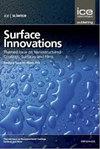增强负载 PbO2 的 Ti4O7 陶瓷电极在废水降解中的光电催化性能
IF 3.5
4区 材料科学
Q3 CHEMISTRY, PHYSICAL
引用次数: 0
摘要
光电催化氧化技术(PEC)被认为是一种处理有机废水的高效工艺,其性能取决于 PEC 光阳极的特性。因此,以合适的半导体材料为基础构建异质纳米结构光电极,以实现快速诱导载流子转移效率,对于高性能 PEC 技术至关重要。本文通过水热法将 PbO2 纳米球与 Ti4O7 结合,合成了具有高效 PEC 性能的 Ti4O7/PbO2 陶瓷光电极。为了最大限度地提高陶瓷电极的 PEC 性能,通过调节水热温度对 Ti4O7/PbO2 纳米异质结构进行了优化。优化后的陶瓷电极具有较低的塔菲尔斜率、较低的电荷转移电阻和良好的光电流响应,在降解活性艳蓝 KN-R 方面表现出高效的 PEC 活性(约 92.21%)。Ti4O7/PbO2-110 的高效 PEC 性能源于 Ti4O7 和 PbO2 之间形成的 II 型异质结,它实现了高效的光生载流子分离,并促进了中间活性物种的形成。这项工作不仅验证了 Ti4O7/PbO2-110 在 PEC 水净化中的高效性能,还为制备具有高 PEC 效率的异质结构陶瓷光电极提供了参考策略。本文章由计算机程序翻译,如有差异,请以英文原文为准。
Enhanced photoelectrocatalytic performance of Ti4O7 ceramic electrodes loaded with PbO2 for wastewater degradation
Photoelectrocatalytic oxidation technology (PEC) is considered to be an efficient process for the treatment of organic wastewater, and its performance depends on the characteristics of the PEC photoanodes. Therefore, the construction of heterogeneous nanostructured photoelectrodes based on suitable semiconductor materials for fast-induced carrier transfer efficiency is essential for the high-performance PEC technique. Herein, the Ti4O7/PbO2 ceramic photoelectrode with efficient PEC performance was synthesized by coupling PbO2 nanospheres with Ti4O7 via a hydrothermal method. To maximize the PEC performance of the ceramic electrodes, the Ti4O7/PbO2 nano-heterostructures were optimized by modulating the hydrothermal temperature. The optimized ceramic electrodes possessed a low Tafel slope, low charge transfer resistance, and good photocurrent response.It exhibited efficient PEC activity (ca. 92.21 %) for the degradation of reactive brilliant blue KN-R. The efficient PEC performance of Ti4O7/PbO2-110 arises from the formation of a type II heterojunction between Ti4O7 and PbO2, which achieves efficient photogenerated carrier separation and facilitates the formation of intermediate active species. This work not only validates the efficient performance of Ti4O7/PbO2-110 for PEC water purification but also provides a reference strategy for the preparation of heterostructured ceramic photoelectrodes with high PEC efficiency.
求助全文
通过发布文献求助,成功后即可免费获取论文全文。
去求助
来源期刊

Surface Innovations
CHEMISTRY, PHYSICALMATERIALS SCIENCE, COAT-MATERIALS SCIENCE, COATINGS & FILMS
CiteScore
5.80
自引率
22.90%
发文量
66
期刊介绍:
The material innovations on surfaces, combined with understanding and manipulation of physics and chemistry of functional surfaces and coatings, have exploded in the past decade at an incredibly rapid pace.
Superhydrophobicity, superhydrophlicity, self-cleaning, self-healing, anti-fouling, anti-bacterial, etc., have become important fundamental topics of surface science research community driven by curiosity of physics, chemistry, and biology of interaction phenomenon at surfaces and their enormous potential in practical applications. Materials having controlled-functionality surfaces and coatings are important to the manufacturing of new products for environmental control, liquid manipulation, nanotechnological advances, biomedical engineering, pharmacy, biotechnology, and many others, and are part of the most promising technological innovations of the twenty-first century.
 求助内容:
求助内容: 应助结果提醒方式:
应助结果提醒方式:


